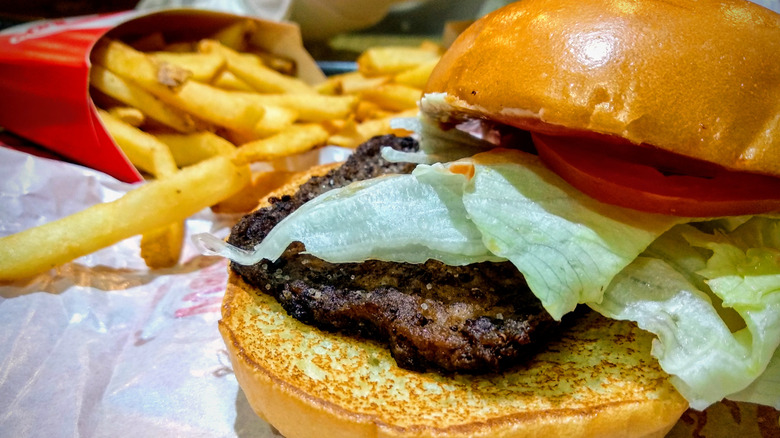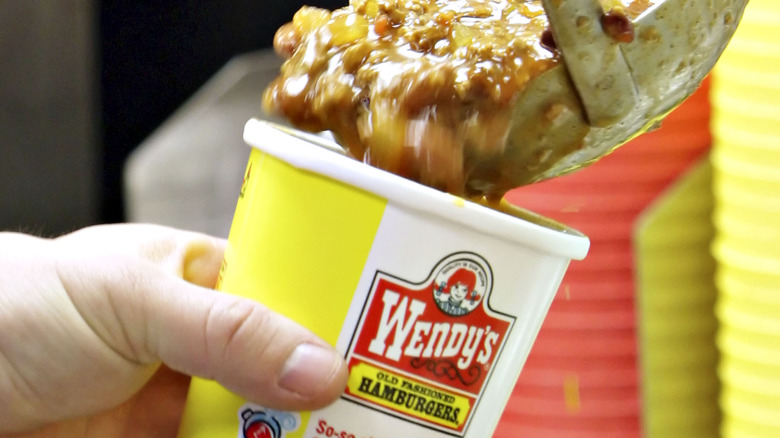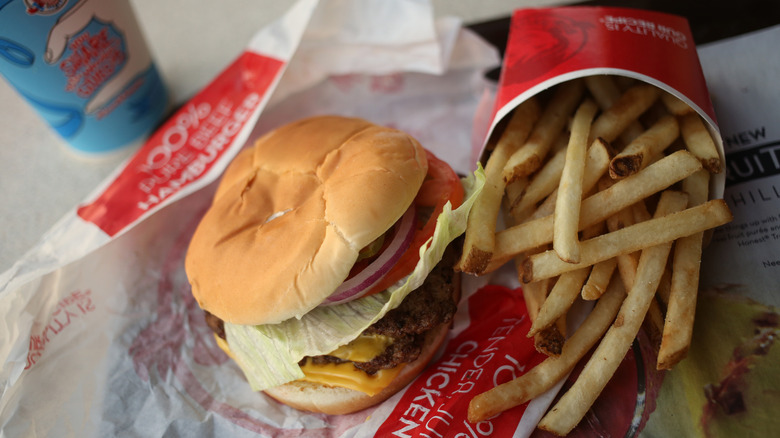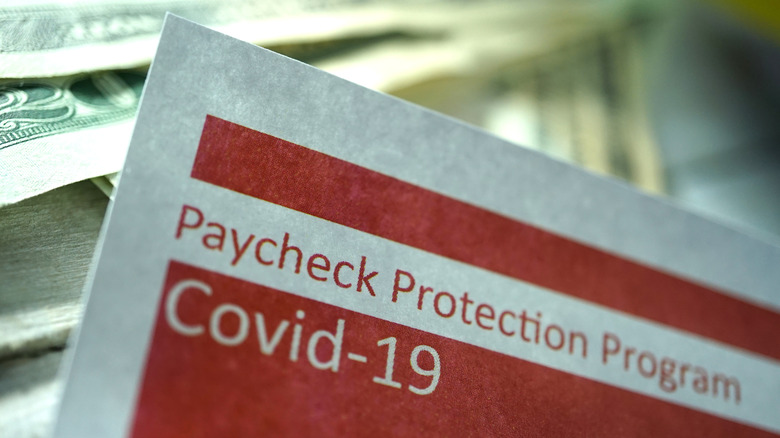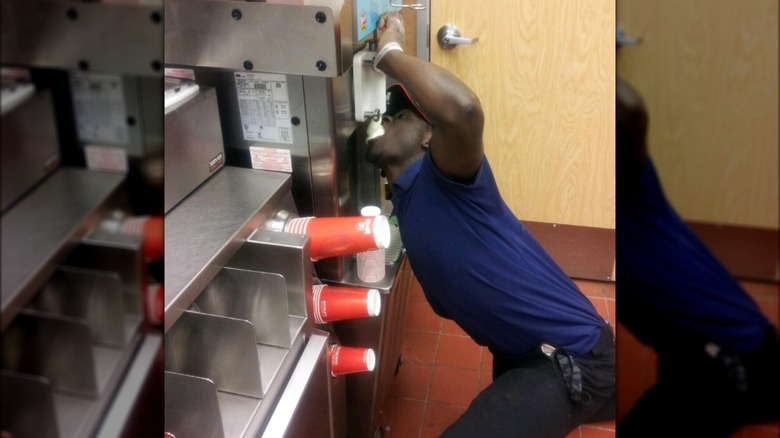These 11 Scandals Shook Wendy's To Its Core
Wendy's is an American fast food icon that's provided tasty, artery-clogging cuisine since its founding in 1969. Famous for its meaty Baconator burger and deliciously sweet chocolate Frosty, the chain is also recognizable for its iconic logo. You know the one — the little ginger-haired girl with pigtails and freckles. She's almost as identifiable as Ronald McDonald or Santa Claus. But some people associate Wendy's with more than just its adorable mascot and square-shaped burgers — the chain has also had its fair share of restaurant scandals.
In the company's defense, no business is perfectly immune from PR disasters that can leave companies reeling from the bad, scathing press. These kinds of situations do more than taint a brand's image. Major incidents can cost it big money, from expensive lawsuits to a decline in consumer sales.
Fortunately for us, Wendy's scandals provide a treasure trove of juicy stories and drama that'll rival your favorite season of "Real Housewives." Wendy's resilience has helped it weather many storms so far. But who knows when or if the next scandal may sink the ship for good. Take a gander, dear readers, at the 11 scandals that shook Wendy's to its core.
1. Chili finger lady
Perhaps the most famous Wendy's scandal, the chili finger lady became a national headline and raised the bar for over-the-top fast food hoaxes. Even if you didn't know the exact restaurant where this happened, you've likely heard vague tales of this story. The perpetrator even has her own Wikipedia page. It was that big. So here's what happened.
In 2005, a woman by the name of Anna Ayala walked into a Wendy's in San Jose, California, and ordered herself a bowl of Wendy's iconic chili. She alleged that she found a severed human finger in the chili and sued the company. This allegation created a media storm of negative press and investigations that would cost the franchise more than $20 million in lost revenue and damages. For a while, this debacle decimated Wendy's reputation.
However, it was discovered that Ms. Ayala was a bonafide fraudster, and she eventually pleaded guilty to grand larceny charges. The wild part is that she planted the finger in the chili after her husband acquired it from an acquaintance who lost it in an industrial accident. So yes, the finger very much was a real human finger, adding an extra creepy factor to an already morbid tale. Ayala was sentenced to nine years in prison the following year for her attempted fraud, serving four. Her husband was sentenced to 12 years for supplying the finger.
2. Woman hospitalized after eating a cheeseburger
In July 2022, a Louisiana woman's dining experience at her local Wendy's began like any other fast-food outing. She ordered her medium double cheeseburger combo and all seemed well at first as she chowed down. However, what followed was far from typical, and the customer would soon regret that innocent decision. The victim, Jena Vogt, fell ill within 24 hours of consuming the contaminated burger and experienced nausea and gastrointestinal issues.
As the symptoms progressively worsened, Vogt was hospitalized and diagnosed with a plethora of medical problems, such as E. coli, septic shock, sepsis, acute GI bleeding, and cerebral hemorrhage. With an extensive list of health afflictions and medical bills, Vogt and her husband sued Wendy's for $75,000 in damages, alleging the burger was contaminated because the food was improperly handled or the staff did not follow proper handwashing procedures. The couple claimed their marriage suffered due to the incident as well.
The resolution to this lawsuit is unclear for now, but if nothing else, this accident serves as a stark reminder of the importance of food safety and quality control. It only takes one slip-up for something like this to happen.
3. E. coli outbreak
When you go out to eat at your favorite fast food restaurant, you probably don't think you'll get sick. It's something that many people understand to be possible, but don't give too much thought to from day to day. However, according to a study from the Centers for Disease Control and Prevention, hundreds of food-based outbreaks occur every year, leading to thousands of unsuspecting consumers coming down with serious foodborne illnesses. This is what happened with Wendy's next major scandal on this list, which trumped its Louisiana cheeseburger debacle tenfold.
In 2022, Wendy's came under extreme scrutiny when an E. coli outbreak traced back to the restaurant sickened 109 customers, hospitalizing 52 across six states. According to interviews by public health officials in charge of the investigation, more than 80% of the affected people reported eating Wendy's recently, with many having eaten sandwiches and burgers with romaine lettuce. This particular vegetable is often the cause of E. coli outbreaks in the food industry, as it's sometimes grown in close proximity to animal fecal matter that's contaminated with E. coli (via VeryWell Health). This outbreak ended fairly quickly, and the investigation concluded before discovering the exact cause.
Though the damage had already been done, Wendy's was swift to remove the romaine lettuce from all the affected regions, likely aiding in the effort to stop the spread of the infections before it got out of control.
4. 2015 cyberattack
The company went through a particularly rough patch in 2015-2016 when it was targeted in a massive cyberattack. Amid the digital crisis, the customers and the company were left shaken. The breach impacted more than 1,000 Wendy's restaurants, sparking serious concern and highlighting the growing vulnerabilities of doing business in the digital era where everything is at risk of exploitation and theft.
Hackers infiltrated Wendy's point-of-sale systems by installing malware. Even after the initial investigation was concluded, another malware variant was discovered — not one but two waves of attacks illustrated the company's security shortcomings. Experts during the investigation were clear — Wendy's lack of effective monitoring and auditing did it no favors and was part of why the breach went unnoticed for so long.
These attacks gave the hackers access to highly sensitive customer data including credit card information. Of course, Wendy's did not get away from this crisis unscathed. The company took a massive financial hit, agreeing to pay $50 million to settle all the data breach claims filed against it.
5. Phone scams
Look, no one's perfect, and we are all prone to deception. Phone scams can happen to anyone, and two incidents involving Wendy's employees are stark reminders of the need for extreme caution against nefarious scammers.
In 2020, in St. Johns County, Florida, a 73-year-old Wendy's restaurant employee fell victim to a cunning scam. The caller, impersonating a Wendy's corporate manager, instructed the woman to take cash from the restaurant's safe and wire it to her bank account so the caller could withdraw it to purchase a new sanitation unit for the store. The employee was promised a $500 reward for her cooperation. Trusting the supposed authority on the end of the line, she complied. Unfortunately, this ruse would cost her, and the scammer ended up stealing the money from her bank account. During the investigation, she was suspended from her job, highlighting the far-reaching consequences of such scams.
In a similar incident in Jackson, Michigan, in 2018, a Wendy's manager received a call that seemed legitimate. The caller urged them to withdraw money from the safe and purchase prepaid credit cards at Rite Aid. Believing this person to be a corporate financial officer, the manager complied and shared all the card details with the scammer. The manager later became suspicious and called the police, but it may have been too late to recover the money.
6. Andrew Levy's PPP loan embezzlement scheme
During the pandemic, Paycheck Protection Program loans were a saving grace for many workers and companies, helping to ease the pressures of financial stagnation in the economy. But, with a lack of oversight and administrative regulation, some misused the PPP loans and took matters into their own greedy hands. The tale of Andrew Levy raised quite a few eyebrows in the world of fast food. Levy was a Wendy's franchisee and the CEO of Starboard Group, a firm that oversaw over 100 Wendy's locations across seven states and benefitted from $9 million in PPP loans.
His story took a twist when Sandi Adler, the Vice President of Legal Affairs and Human Resources for Starboard Group, became suspicious of how the pandemic relief funds were being used and blew the whistle on Andrew Levy, alleging he had embezzled a million dollars in PPP loan payments to purchase a home in Montana. Adler also alleged that Levy told her to lie to the landlords, suppliers, lenders, and even creditors by saying that the firm hadn't received any PPP money and couldn't cover its debts. Ultimately, Levy wanted to turn her into an unwilling accomplice.
As a result of Adler's courage, a lawsuit was brought against Levy in June 2020, illustrating the critical role that whistleblowers can play in exposing wrongdoing, especially when it involves taxpayer-funded assistance meant to help struggling small businesses survive challenging times.
7. The frosty guzzler
When it comes to people's food, the last thing an employee should do is play with it or the machines that make it. When employees start doing weird things behind the scenes, it sows distrust in food safety and sheds a bad light on the fast-food chain as a whole. Whether someone's job is to flip burgers or salt fries, any behavior that subverts our expectations about hygiene is a complete no-go. Never mess with people's food. Ever! Unfortunately, some people have too much time on their hands and end up acting out. One Wendy's employee went viral in 2013 for just that.
An image of an unnamed Wendy's employee guzzling a Frosty directly from the Frosty machine took the internet by storm, turning off potential customers and spreading the idea that Wendy's doesn't have a handle on its in-house safety protocols. Realistically, it is impossible to completely prevent these situations from happening. Still, Wendy's X (formerly known as Twitter) account responded directly and swiftly to this incident after it went viral, stating the employee was fired and that proper procedures would be reinforced.
The scary bit about this whole scandal is that this is just one incident that was photographed and caught. Who knows how often employees are doing gross things to food? Remember that nameless Taco Bell employee who licked a stack of taco shells in 2013? Truly, a thing of nightmares.
8. Kitchen sink bath
Most of us have seen the employee safety and sanitation policies hung on the bathroom walls of fast food restaurants: Wash your hands before returning to work. But this probably isn't what they meant.
In two entirely unrelated incidents, employees decided to take a bath in the industrial sink at Wendy's, and yes, you read that right. One scandal unfolded in 2020 when a video of an employee washing himself in a Wendy's sink went viral. This bizarre incident shocked customers and led to swift action, with the employees involved immediately being served their walking papers. A previous case of an employee hopping into the sink for a soak in 2019 was even worse because their coworkers encouraged the stunt, all in the name of humor. Unsurprisingly, this too made its way onto social media and quickly went viral. Those employees were also let go, naturally.
These incidents are a quirky reminder that while humor can brighten the workplace, there are limits. People go to Wendy's for a chocolate Frosty or a burger, not a bath-time show.
9. Collecting employee fingerprints
Wendy's found itself in a pickle when a scandal broke out regarding the unlawful collection of employee fingerprints in Illinois. Here's the scoop: Wendy's employed biometric clocks to scan employee fingerprints when they clocked in and out or used the cash register and point-of-sale systems. Sounds cool and high-tech, right? But there's always a catch to digital technology — it can be grossly invasive. Wendy's didn't properly disclose how this data was being handled and used, a big no-no according to the state's Biometric Information Privacy Act (BIPA).
You might be wondering what the big deal is. Companies use biometric information all the time to streamline data collection processes and make it more efficient to operate within a fast-paced working environment. But the thing is, fingerprints are unique, permanent identifiers. Unlike ID cards and key fobs, you can't replace or lose your fingerprints, and once your fingerprint data is out there, it's out there. The privacy risks are much higher. As a result of its carelessness, the company was sued in 2018.
10. Franchisee sparks outrage on X
X, where news can go viral in the blink of an eye, saw its fair share of drama when Wendy's came under fire. The hubbub started in 2020 when it was revealed that a major Wendy's franchisee, James Bodenstedt, had made a hefty donation of $440,000 to the Trump Victory PAC for the former president's reelection campaign. What really stirred the pot was that Bodenstedt's donation got him a seat at the table with Trump during a meeting involving other leaders in the restaurant industry. X users, known for their quick and passionate reactions, lit up with outrage.
One X user wrote a scathing reply to the news, tweeting, "There's always Five Guys and so far none of them are racist!"
For Wendy's, the backlash was more than just a social media storm; it was a reputation hit. In recent years, the brand had been winning hearts (and likes) on X with its clever banter. It even instituted a National Roast Day, where the brand would roast competitors and fans with humor and wit. The Wendy's X account had become a symbol of the brand's personality. But this time, Wendy's was on the receiving end of the roasts. Twitter users, many of whom were fans of the brand, called for a boycott, and the hashtag #WendysIsOverParty started trending. It just goes to show that in the age of social media, a brand's reputation is as crucial as the quality of its burgers.
11. Fair Food Program
In recent years, there has been much discourse around alleged modern slavery in the fast food supply chain. Farm workers have taken to the streets to protest human rights violations on farms believed to be enabled by corporations. To combat these unjust working conditions, the Fair Food Program was launched in 2011 to ensure that workers receive fair wages and that farms are up to par with safety and operational standards.
Many of the nation's biggest fast food chains have joined the Fair Food Program since its inception, including household names like Burger King, Subway, McDonald's, Chipotle, KFC, and Taco Bell. Wendy's refusal to join the program over the past decade has sparked a Wendy's Boycott movement and other efforts to pressure the company to join. But as a Wendy's spokesperson put it in 2022, "Wendy's does not participate in the Fair Food Program because there is no nexus between the program and our supply chain ... Since 2019, Wendy's has sourced our North American tomato supply exclusively from indoor, hydroponic greenhouse farms, while the Fair Food Program predominantly operates in outdoor, conventional tomato growing environments." The company claims that it has its own measures to ensure agricultural workers are being treated fairly, though critics have cast doubt on the efficacy of these programs.
